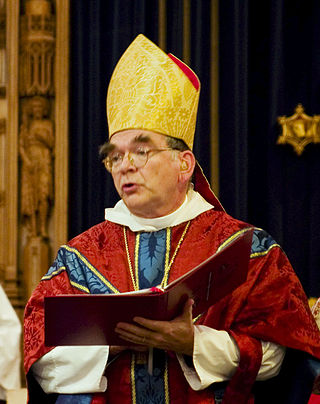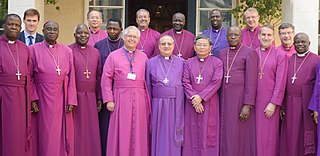
The Anglican Communion is the third largest Christian communion after the Roman Catholic and Eastern Orthodox churches. Formally founded in 1867 in London, the communion has more than 85 million members within the Church of England and other autocephalous national and regional churches in full communion. The traditional origins of Anglican doctrine are summarised in the Thirty-nine Articles (1571). The archbishop of Canterbury in England acts as a focus of unity, recognised as primus inter pares, but does not exercise authority in Anglican provinces outside of the Church of England. Most, but not all, member churches of the communion are the historic national or regional Anglican churches.
Within Christianity, there are a variety of views on sexual orientation and homosexuality. The view that various Bible passages speak of homosexuality as immoral or sinful emerged through its interpretation and has since become entrenched in many Christian denominations through church doctrine and the wording of various translations of the Bible.

John Shelby "Jack" Spong was an American bishop of the Episcopal Church, born in Charlotte, North Carolina. He served as the Bishop of Newark, New Jersey from 1979 to 2000. Spong was a liberal Christian theologian, religion commentator, and author who called for a fundamental rethinking of Christian belief away from theism and traditional doctrines. He was known for his progressive and controversial views on Christianity, including his rejection of traditional Christian doctrines, his advocacy for LGBTQ rights, and his support for interfaith dialogue. Spong was a contributor to the Living the Questions DVD program and was a guest on numerous national television broadcasts. Spong died on September 12, 2021, at his home in Richmond, Virginia, at the age of 90.

Vicky Gene Robinson is a retired bishop of the Episcopal Diocese of New Hampshire. Robinson was elected bishop coadjutor in 2003 and succeeded as bishop diocesan in March 2004. Before becoming bishop, he served as Canon to the Ordinary for the Diocese of New Hampshire.
Since the 1990s, the Anglican Communion has struggled with controversy regarding homosexuality in the church. In 1998, the 13th Lambeth Conference of Anglican bishops passed a resolution "rejecting homosexual practice as incompatible with Scripture". However, this is not legally binding. "Like all Lambeth Conference resolutions, it is not legally binding on all provinces of the Communion, including the Church of England, though it commends an essential and persuasive view of the attitude of the Communion." "Anglican national churches in Brazil, South Africa, South India, New Zealand and Canada have taken steps toward approving and celebrating same-sex relationships amid strong resistance among other national churches within the 80 million-member global body. The Episcopal Church in the U.S. has allowed same-sex marriage since 2015, and the Scottish Episcopal Church has allowed same-sex marriage since 2017." In 2017, clergy within the Church of England indicated their inclination towards supporting same-sex marriage by dismissing a bishops' report that explicitly asserted the exclusivity of church weddings to unions between a man and a woman. At General Synod in 2019, the Church of England announced that same-gender couples may remain recognised as married after one spouse experiences a gender transition. In 2023, the Church of England announced that it would authorise "prayers of thanksgiving, dedication and for God's blessing for same-sex couples."
The Confessing Movement is a largely lay-led theologically conservative Christian movement that opposes the influence of theological liberalism and theological progressivism currently within several mainline Protestant denominations and seeks to return those denominations to its view of orthodox doctrine or to form new denominations and disfellowship (excommunicate) them if the situation becomes untenable. Those who eventually deem dealing with theological liberalism and theological progressivism within their churches and denominations as not being tenable anymore would later join or start Confessional Churches and/or Evangelical Churches that continue with the traditions of their respective denominations and maintaining orthodox doctrine while being ecclesiastically separate from the Mainline Protestant denominations.

The mainline Protestant churches are a group of Protestant denominations in the United States and Canada largely of the theologically liberal or theologically progressive persuasion that contrast in history and practice with the largely theologically conservative evangelical, fundamentalist, charismatic, confessional, Confessing Movement, historically Black church, and Global South Protestant denominations and congregations. Some make a distinction between "mainline" and "oldline", with the former referring only to denominational ties and the latter referring to church lineage, prestige and influence. However, this distinction has largely been lost to history and the terms are now nearly synonymous.

Robert William Duncan is an American Anglican bishop. He was the first primate and archbishop of the Anglican Church in North America (ACNA) from June 2009 to June 2014. In 1997, he was elected bishop of the Episcopal Diocese of Pittsburgh. In 2008, a majority of the diocesan convention voted to leave the diocese and the Episcopal Church and, in October 2009, named their new church the Anglican Diocese of Pittsburgh. Duncan served as bishop for the new Anglican diocese until 10 September 2016 upon the installation of his successor, Jim Hobby.
In 2003, the Lambeth Commission on Communion was appointed by the Anglican Communion to study problems stemming from the consecration of Gene Robinson, the first noncelibate self-identifying gay priest to be ordained as an Anglican bishop, in the Episcopal Church in the United States and the blessing of same-sex unions in the Anglican Diocese of New Westminster. The Commission, chaired by Archbishop Robin Eames, published its findings as the Windsor Report on 18 October 2004. The report recommended a covenant for the Anglican Communion, an idea that did not come to fruition.

Michael Bruce Curry is an American bishop who is the 27th and current Presiding Bishop and primate of the Episcopal Church. Elected in 2015, he is the first African American elected to the role, having previously served as Bishop of North Carolina from 2000 to 2015. His tenure as Presiding Bishop will end in October 2024 and he will be succeeded by Sean Rowe.
In the United States, the history of the Episcopal Church has its origins in the Church of England, a church which stresses its continuity with the ancient Western church and claims to maintain apostolic succession. Its close links to the Crown led to its reorganization on an independent basis in the 1780s. In the nineteenth and early twentieth centuries, it was characterized sociologically by a disproportionately large number of high status Americans as well as English immigrants; for example, more than a quarter of all presidents of the United States have been Episcopalians. Although it was not among the leading participants of the abolitionist movement in the early 19th century, by the early 20th century its social engagement had increased to the point that it was an important participant in the Social Gospel movement, though it never provided much support for the Prohibitionist movement. Like other mainline churches in the United States, its membership decreased from the 1960s. This was also a period in which the church took a more open attitude on the role of women and toward homosexuality, while engaging in liturgical revision parallel to that of the Roman Catholic Church in the post Vatican II era.
The Anglican realignment is a movement among some Anglicans to align themselves under new or alternative oversight within or outside the Anglican Communion. This movement is primarily active in parts of the Episcopal Church in the United States and the Anglican Church of Canada. Two of the major events that contributed to the movement were the 2002 decision of the Diocese of New Westminster in Canada to authorise a rite of blessing for same-sex unions, and the nomination of two openly gay priests in 2003 to become bishops. Jeffrey John, an openly gay priest with a long-time partner, was appointed to be the next Bishop of Reading in the Church of England and the General Convention of the Episcopal Church ratified the election of Gene Robinson, an openly gay non-celibate man, as Bishop of New Hampshire. Jeffrey John ultimately declined the appointment due to pressure.

The Global South Fellowship of Anglican Churches (GSFA), formerly known as Global South (Anglican), is a communion of 25 Anglican churches, of which 22 are provinces of the Anglican Communion, plus the Anglican Church in North America and the Anglican Church in Brazil. The Anglican Diocese of Sydney is also officially listed as a member.
This article largely discusses presence of openly lesbian, gay, bisexual, and transgender and queer bishops in churches governed under episcopal polities. The existence of LGBT bishops in the Anglican, Catholic, Lutheran, Methodist and other traditions is a matter of historical record, though never, until recently, were LGBT clergy and bishops ordained by any of the main Christian denominations. Homosexual activity was engaged in secretly. When it was made public, official response ranged from suspension of sacramental duties to laicisation.

William Howard Love is an American prelate. Love was the ninth bishop of the Episcopal Diocese of Albany, and he served in that role from 2007 until January 31, 2021. Beginning in April 2021, Love has served as Assistant Bishop of the Anglican Diocese of the Living Word.
The Global Fellowship of Confessing Anglicans is a communion of conservative Anglican churches that formed in 2008 in response to ongoing theological disputes in the worldwide Anglican Communion. Conservative Anglicans met in 2008 at the Global Anglican Future Conference, creating the Jerusalem Declaration and establishing the Fellowship of Confessing Anglicans (FCA), which was rebranded as GAFCON in 2017.

The Episcopal Church (TEC), officially the Protestant Episcopal Church in the United States of America (PECUSA), also spelled the United States Episcopal Church (USEC), is a member church of the worldwide Anglican Communion based in the United States with additional dioceses elsewhere. It is a mainline Protestant denomination and is divided into nine provinces. The presiding bishop of the Episcopal Church is Michael Bruce Curry, the first African American bishop to serve in that position. He will be succeeded by Sean Rowe in November 2024.
The ordination of lesbian, gay, bisexual and/or transgender (LGBT) clergy who are open about their sexuality or gender identity; are sexually active if lesbian, gay, or bisexual; or are in committed same-sex relationships is a debated practice within some contemporary Christian denominations.
John Hewitt Rodgers Jr. (1930–2022) was an American Anglican theologian and bishop. The author of multiple commentaries on the Thirty-Nine Articles of Religion, he was a founding faculty member at Trinity School for Ministry and served as its dean and president from 1978 to 1990. In 2000, he played a role in the global Anglican realignment when he was consecrated as a bishop of the Anglican Church of Rwanda to oversee congregations in North America through the Anglican Mission in America.









